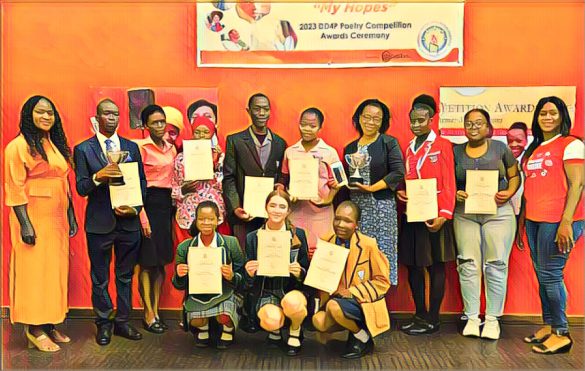The DD4P poetry competition, a mix of art and activism, is proving effective against GBV in Zimbabwe. Sarah Murera, the United Nations specialist, who approved of it, referred to it as part of a comprehensive worldwide fight against such a long existing problem.
Poetry as a Powerful Medium
Held at the Harare City Library, the 8th edition of the DD4P poetry competition drew attention for its creative approach to tackling GBV. The competition aligns with the 16 Days of Activism against GBV, a global campaign emphasizing the importance of eradicating violence against women and promoting human rights.
Statistics underline the gravity of the situation: more than a third of all girls in Zimbabwe and 39% of women between 15 and 49 years old in Zimbabwe are victims of GBV. Therefore, it requires creative means of encouraging deliberation and discussion that the DD4P is trying to realize through a poetry contest.
According to a report by Newsday Zimbabwe, the competition, initiated by DD4P founder Hopolang Phororo, has become an important platform for young people to express their views on GBV. By engaging students in creative expression, the competition opens up conversations in classrooms and communities, making a typically challenging topic more approachable.
This year’s event saw impressive participation from schools across Zimbabwe, with John Tallach High and Chisipite Senior School students winning top honors. These young poets used their words to shed light on the harsh realities of GBV, urging action and empathy.
The Role of Educators and Technology
Beverly Abrahams, a novelist and one of the competition’s adjudicators, highlighted the importance of integrating poetry into education. She encouraged students and teachers to use social media platforms to further spread awareness about GBV, demonstrating the power of digital platforms in amplifying crucial messages.
Memory Bvungo, a former competition winner and DD4P ambassador, shared her transformative journey through the competition. Her experience underscores the impact of such initiatives in empowering young women and girls, offering a hopeful glimpse into a future where GBV is actively combatted through education and art.
The competition’s judging panel brought together a range of perspectives, including Nigerian writer and teacher Sefunmi Oladumiye, Tanzanian author Nancy Lazaro, Zimbabwean author Bryony Rheam, and local actress and entrepreneur Chiedza Rwodzi.
As the competition grows, we can see the power of poetry in changing perceptions and breaking the silence around GBV. It demonstrates that through creative expression.


